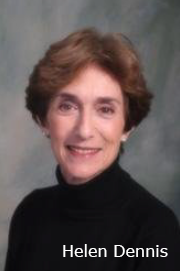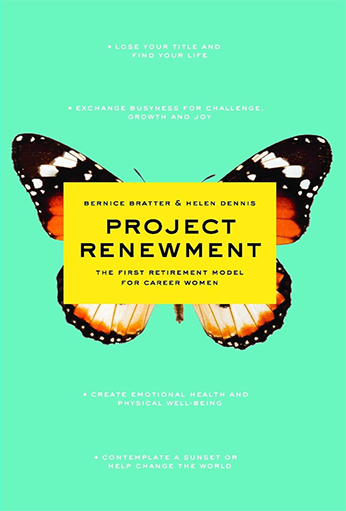
“Renewment” Rather than Retirement
In a recent podcast, syndicated columnist Helen Dennis and I discuss her program for “renewment” as opposed to retirement. Specifically aimed at career women in or moving towards retirement, Dennis and her program co-founder Bernice Bratter have convened more than 40 groups of women working together to find fulfillment in their post-working lives.
These groups of eight to ten women meet regularly, sometimes for decades, to discuss the issues they face in their later years. While each group is autonomous, they are guided by Dennis and Bratter’s book, “Project Renewment: The First Retirement Model for Career Women.” It provides prompts for discussion such as:
- Who am I without my business card?
- What does productivity mean?
- What if my partner retires first?
- What if I end up on my own?

The New Retirement
Dennis explained to me that a lot about retirement has changed in recent decades. This is the first time that we have so many women with careers moving into retirement. In addition, increased longevity has changed post-working life for both men and women.
“Forty years ago, aspirations were different, life expectancy was shorter. Now with increased longevity and better health, people are asking ‘What will get me up in the morning?’ It becomes a moment of personal exploration. ‘Who do I become in the next 20 or 30 years?’ ”
One of the wonderful unintended consequences of the Renewment groups, Dennis says, has been the creation of communities. They have done a lot to combat the loneliness which is an epidemic in the U.S. in general and among older people in particular.

Financial Security
While all the women in the Renewment groups had careers, they are not all on the same footing financially. Women’s careers were often less consistent than men’s since they were often out of the workforce while raising families. As a result, they may have earned less money and now have less money saved up than men.
While the groups don’t talk about the nitty gritty of money, they do discuss what financial security means. It’s a keystone to renewment. “If you’re barely surviving and can’t meet the rent or pay for medications you’re not really thinking about what would be fulfilling.”
Finances also come up in discussing the cost of health care and long-term care, and who will be there for them when they need care.
Dennis comments that retirement is also less affordable than it was 40 years ago due in large part to rising costs, particularly for health care. Now we’re living longer and most people don’t have a traditional pension plan. They are worried about running out of money.
Many participants are continuing to work to some extent for financial reasons and for purpose. Some are working but not getting paid.
Ethnic Differences
I asked Helen if she sees any ethnic differences in retirement. She does, in large part due to financial differences. “Black American workers [tend to] have a less financially secure retirement.” The opportunity for renewment is not necessarily available to all Americans. “Economic stress easily becomes a top priority. You’re worried that you can’t give to your grandchildren what you want to give.” But she also sees a lot of non-White retirees caring for grandchildren, which does have its benefits in terms of providing purpose and combating loneliness.
Recommendations
I ask all my guests for their recommendations to policymakers and individuals. In terms of policy, Helen said that with nearly 7 million Americans suffering from Alzheimer’s disease we need funding other than Medicaid to provide support to families to hire caregivers.
“One out of three Americans 85 and over has Alzheimer’s disease. The 85-plus cohort is the fastest growing segment of the population. It doesn’t take a mathematical genius to see what the demands are going to be for health care, for families. Families cannot afford to pay for the home health care. If there were a way to partially fund that other than Medicaid it could make a big difference.”
For individuals in or approaching retirement, Helen recommends that “assuming your finances are in order, look at retirement as an opportunity to be your best self and more fulfilled. We have more opportunities than we have ever had. We just have to open our minds and look around and be resourceful and take the initiative. Take the initiative, take the risk and see that this can be a time of opportunity.”
Check out Project Renewment here.
For more from Harry Margolis, check out his Risking Old Age in America blog and podcast. He also answers consumer estate planning questions at AskHarry.info. To stay current on the Squared Away blog, join our free email list.
Comments are closed.







Retirement / Intentional change in work-life balance:
Once I got over the hump of making babies, building my house, and developing my career, I began to focus on protecting my financial security as I got older and had less time and enthusiasm to recover from life’s curveballs.
My plan was to be financially stable by 50:
Retirement investing is on track.
Keep debt to a minimum with durations not greater than 36 months.
Find joy in nonwork related life.
As it turned out, this was prophetic planning. I lost my job at 51 following 31 years with the same employer. I was able to quickly find employment that enabled me to avoid dipping into the Buy-out, and add this lump sum to our investments. I had 3 jobs within the next 8 years. The last two were at higher income than my original position at the time I was dismissed. All of the last three positions were ‘opportunities’ to resolve long-standing issues at those companies. The last two positions required long hours and fractured vacations, often with the work phone on. Once the issues were resolved, those positions came to an end. I knew that approaching 59 years of age that I did not look forward to more of this stress and strain on our family life. My wife was not yet able to retire, but she was able to cut back to 4 hour days and retain her seniority and fulltime benefits. Our income from investments and lack of debt enable us to delay taking social security until I reached 70. I was able to ease into retirement over the first 12 months, reading a lot and joining the YMCA to use the pool 3 days a week. Then doing a major kitchen remodel. After that I buddied up with my brother-in-law and we worked on projects, went fishing, hunting and I spent summer weekends traveling with my wife in our RV. I had the RV hooked up and sandwiches made for when she got home at 12:30. We were on the road by 1:00 PM back home Sunday evening unless Monday was a holiday. 2016 My wife got a buy out during a reduction in force. She had over 30 years of seniority and was grandfathered in to a legacy benefits package that enable us to retain the employer based health coverage. February of 2017 we purchased a Motorhome and have been traveling 12 weeks a year with a long layover in southern Florida between the two 6 week wandering trips south in the fall and back north in the spring. We are on track to have her begin taking Social Security January 2026.
None of this would have been possible without the initial planning to stabilize our expenses early in our relationship.
Since June 2016, our income does not require our labor. We are free to take opportunities if we want to, but the desire to do that has melted away.
You can call it Clickity Clack, free wheeler, or anything else-1) it is about how you look at yourself and 2) you aren’t going to change what everyone calls it. It is still Retirement. I will address my time to more productive endeavors.
Thank you for sharing this. Being financially stable is not easy, especially for women, because they need to balance their lives as moms and wives while having careers.